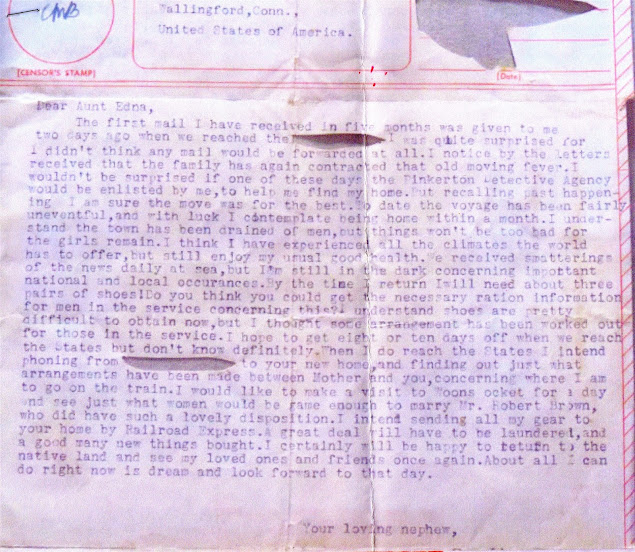
Five years ago today I posted a piece titled, "Was" or "Is" . . . What Tense Makes Most Sense For One's Ancestors? Just over a week ago, I received a comment on that post from someone identified only as "Mark A." Mark said, "I have just heard reference to an actual 'ancestor tense' - apparently used by native Americans when speaking of ancestors. I don't know which tribes, however; I merely stumbled across this while watching the film Home From Home by Edgar Reitz, where one of the characters discovers this while reading a book."
Mark's comment about a possible "ancestor tense" was intriguing and I spent a half hour or so trying to find more about this grammatical anomaly. I was unsuccessful in finding anything specifically referenced as an ancestor tense used by Native Americans of any tribe, but the idea stuck with me and caused me to muse again about the tenses we use when referring to ancestors–especially deceased ancestors. [The film that Mark referenced is actually a German film and apparently a character in the film makes some mention of an ancestor tense based on a book the character is reading. I have not as yet been able to find a place to watch the film myself and so at this point I just have Mark's observation to go by.]
The idea of having a grammatical tense to use specifically when discussing ancestors is fascinating and one wonders how it would work in practice and if any convenient analog could ever develop in English. But leaving that aside until more could be learned about any ancestor tense actually being used by Native Americans, I found myself re-reading my original post and the comments it generated. Now, having thought more on the subject, I am even more convinced that the best tense to use when referring to ancestors–living or deceased–is the present tense.
In musing more on the subject, I am convinced that accuracy and logic dictate the use of the present tense when discussing an ancestor . . . and perhaps especially when discussing a long deceased ancestor such as a 5X great grandparent, for example. Two new thoughts occurred to me:
(1) Due to the power of two, once one gets to talking about ancestors further back than grandparents, the number of individuals sharing the same relationship grows dramatically–as do the surnames involved. Biologically speaking, while each of us has two parents, we have four grandparents, and going back further we have thirty-two 3X great grandparents, five hundred twelve 8X great grandparents, 1,024 9X great grandparents . . . and on and on.
(2) In most cases, anyone above the great grandparent level while living would have had no inkling about our present existence, let alone any idea of a relationship to themselves. My 4x great grandfather, John Tew, Sr. who died in 1827, is one of my 32 4X great grandparents. There is no way that he could ever have envisioned the six generations, the marriages, and the intervening families that ultimately resulted in my birth and created a relationship to him. Perhaps more starkly, my 4x great grandfather on my mother's side, James Carpenter who died in 1812 (my mother's 3x great grandfather), would never have envisioned becoming the 4X great grandfather of someone named John Tew.
Taken together, the above two observations clarify why the present tense is perhaps the best tense to use when talking about ancestors. The logic of the present tense is captured in the use of the word "becoming" in the last sentence of paragraph 2 immediately above. When each of my named 4X great grandfathers was alive, he did not have any relationship to me because I did not yet exist and he could not have even imagined me. Each of them only became one of my many 4X great grandfathers after I was born (and when I discovered and confirmed our relationship).
At present I am one of the two grandfathers of my granddaughters and upon their births John Tew, Sr. and James Carpenter became two of their 6X great grandfathers (along with 126 other 6x great grandfathers). It seems both illogical and inaccurate to say that either of them "was" my 4X great grandfather (or my granddaughters' 6X great grandfathers) because it implies either that retationship existed back when they did exist (and it simply did not), or it implies that at one time they had the relationship of a great grandparent to me, but that the relationship somehow no longer exists if I should say "he was my 4X great grandfather." Once someone becomes a great grandfather, the simple, natural fact that he happens to be dead when one of his descendnats is born does not erase that relationship because he only became a great grandfather to that descendant when that remote descendant was eventually born. Looking at it another way, while I am presently a grandfather, there is no guarantee that I will ever become a great grandfather, let alone a several times great grandfather; but, if in the fullness of time and a continuation of generations from my grandchildren, when other descendants are born, then at that moment (and not before) I will become an ancestor and the relationship will be established so that those descendants for the first time can say John D. Tew is one of my ___ great grandfathers.
_ _ _ _ _ _ _ _ _ _ _ _ _ _ _ _
Image created by the author using the family's 1958 edition of "SCRABBLE For Juniors" manufactured by Selchow & Richter Co. for The Production and Marketing Company (the copyright owner).
_ _ _ _ _ _ _ _ _ _ _ _ _ _ _ _
Copyright 2020, John D. Tew
_ _ _ _ _ _ _ _ _ _ _ _ _ _ _ _





